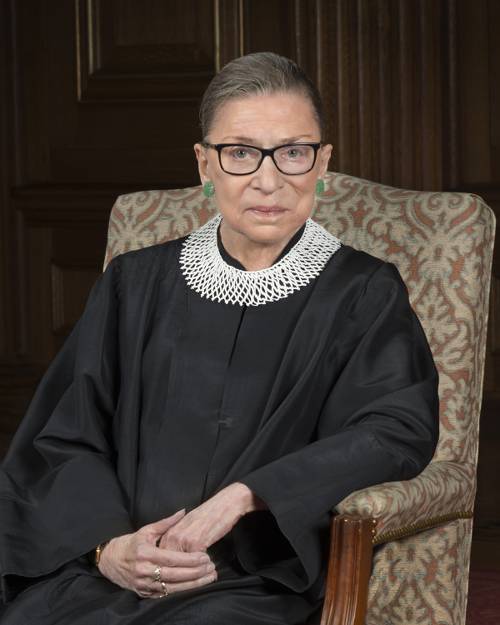
FAQ About Ruth Bader Ginsburg

Who was Ruth Bader Ginsburg?
Ruth Bader Ginsburg was an Associate Justice of the Supreme Court of the United States. She served from 1993 until her death in 2020, becoming the second woman to ever serve on the Supreme Court. Ginsburg was renowned for her work on gender equality and civil liberties, advocating for women's rights throughout her career.

When was Ruth Bader Ginsburg born?
Ruth Bader Ginsburg was born on March 15, 1933, in Brooklyn, New York. She grew up in a working-class neighborhood and went on to become one of the most influential figures in American law.

What is Ruth Bader Ginsburg known for?
Ruth Bader Ginsburg is best known for her advocacy for gender equality and her role as a champion of civil rights. Throughout her career, she worked tirelessly to advance the legal standing of women and marginalized communities. Her legacy includes landmark court cases and opinions that have significantly impacted American law.

Where did Ruth Bader Ginsburg attend law school?
Ruth Bader Ginsburg attended Harvard Law School and later transferred to Columbia Law School, where she earned her law degree in 1959. She was one of the few women in her class at both institutions and faced considerable discrimination and challenges, which she overcame.

What were some major cases Ruth Bader Ginsburg worked on?
During her time on the Supreme Court, Ruth Bader Ginsburg contributed to several landmark cases. Among these was United States v. Virginia, where she wrote the majority opinion that struck down the male-only admissions policy at the Virginia Military Institute. Her dissenting opinions, such as in Ledbetter v. Goodyear Tire & Rubber Co., also highlighted gender discrimination issues and have had a lasting impact.

How did Ruth Bader Ginsburg become a Supreme Court Justice?
Ruth Bader Ginsburg was nominated to the Supreme Court by President Bill Clinton in 1993. After a confirmation process, she was appointed as an Associate Justice, becoming the second woman to ever serve on the highest court in the United States.

What impact did Ruth Bader Ginsburg have on gender equality?
Ruth Bader Ginsburg's impact on gender equality is profound. Throughout her career, she worked on cases that challenged laws and policies discriminating against women. Her advocacy helped establish crucial legal precedents that protect women's rights, contributing to significant advancements in gender equality in the United States.

What was Ruth Bader Ginsburg's early career like?
Early in her career, Ruth Bader Ginsburg faced significant gender discrimination in the legal profession. Despite these challenges, she became a professor at Rutgers Law School and later at Columbia Law School. During this time, she also co-founded the Women's Rights Project at the American Civil Liberties Union (ACLU), where she successfully argued several cases before the Supreme Court, setting the stage for her later judicial career.

What is the "Notorious RBG"?
The "Notorious RBG" is a nickname affectionately given to Ruth Bader Ginsburg. The moniker was inspired by the rapper The Notorious B.I.G. and was used to celebrate her bold and impactful dissents, progressive legal views, and her illustrious career in law. This nickname gained popularity, particularly among young people, turning Ginsburg into a cultural icon.

What was one of Ruth Bader Ginsburg's famous dissenting opinions?
One of Ruth Bader Ginsburg's famous dissenting opinions was in the case of Shelby County v. Holder (2013), where she opposed the majority's decision to strike down key provisions of the Voting Rights Act. Ginsburg argued that the Act was essential in preventing discrimination in voting and that its dismantling threatened civil rights advancements.

How did Ruth Bader Ginsburg pass away?
Ruth Bader Ginsburg passed away on September 18, 2020, due to complications from metastatic pancreatic cancer. Her death prompted a nationwide outpouring of tributes, highlighting her contributions to American law and her influence as a role model for women and minority rights advocates.

What awards did Ruth Bader Ginsburg receive?
Throughout her career, Ruth Bader Ginsburg received numerous awards and honors for her contributions to law and justice. These include the American Bar Association's Thurgood Marshall Award, the National Women's Hall of Fame induction, and the Liberty Medal from the National Constitution Center, among others.

How did Ruth Bader Ginsburg influence American society?
Ruth Bader Ginsburg significantly influenced American society by advocating for equal rights and highlighting issues of gender discrimination. Her judicial opinions and legal strategy helped shape modern interpretations of equality and civil liberties, leaving a lasting legacy on both the legal system and American culture.

Did Ruth Bader Ginsburg write any books?
Yes, Ruth Bader Ginsburg authored several books. Her notable works include "My Own Words," a compilation of her speeches and writings, which provides personal insights into her perspective on law, justice, and social change. She co-authored several legal texts and was involved in numerous publications addressing her judicial philosophy.

What challenges did Ruth Bader Ginsburg face in her career?
Ruth Bader Ginsburg faced significant challenges in her career, primarily related to gender discrimination. As one of the few women in law school and later in her professional roles, she met resistance and bias. Her struggle for equal treatment fueled her advocacy for gender equality, driving her to challenge discriminatory practices and inspire future generations of female lawyers.

What was Ruth Bader Ginsburg's impact on the LGBTQ+ community?
Ruth Bader Ginsburg had a positive impact on the LGBTQ+ community through her support of equal rights. She voted in favor of key decisions, such as Obergefell v. Hodges, which legalized same-sex marriage across the United States, reinforcing her commitment to equality and justice for all individuals regardless of their sexual orientation.

What are some notable quotes by Ruth Bader Ginsburg?
Ruth Bader Ginsburg is known for several notable quotes, one of them being, "Fight for the things that you care about, but do it in a way that will lead others to join you." Another inspiring quote is, "Real change, enduring change, happens one step at a time." These quotes reflect her philosophy of gradual, determined advocacy for social justice.

How did Ruth Bader Ginsburg approach civil rights issues?
Ruth Bader Ginsburg approached civil rights issues with a focus on equality and fairness. Her legal strategy often involved incremental changes that collectively led to significant legal reforms. Through her opinions and dissents, she consistently emphasized the importance of protecting individual rights and advancing social justice for underrepresented groups.

What role did Ruth Bader Ginsburg play in the American Civil Liberties Union (ACLU)?
Ruth Bader Ginsburg played a pivotal role in the American Civil Liberties Union by co-founding the Women's Rights Project in 1972. In this position, she argued several landmark cases before the Supreme Court that advanced the legal standing of women. Her work at the ACLU was instrumental in building her national reputation as a staunch advocate for gender equality.

How is Ruth Bader Ginsburg's legacy remembered today?
Ruth Bader Ginsburg's legacy is remembered today through her profound impact on American law and the ongoing fight for gender equality and civil rights. She is celebrated as a cultural and feminist icon, and her life and work continue to inspire future generations in the legal field and beyond. Various scholarships, awards, and even films made in her honor reflect the enduring influence of her contributions.
